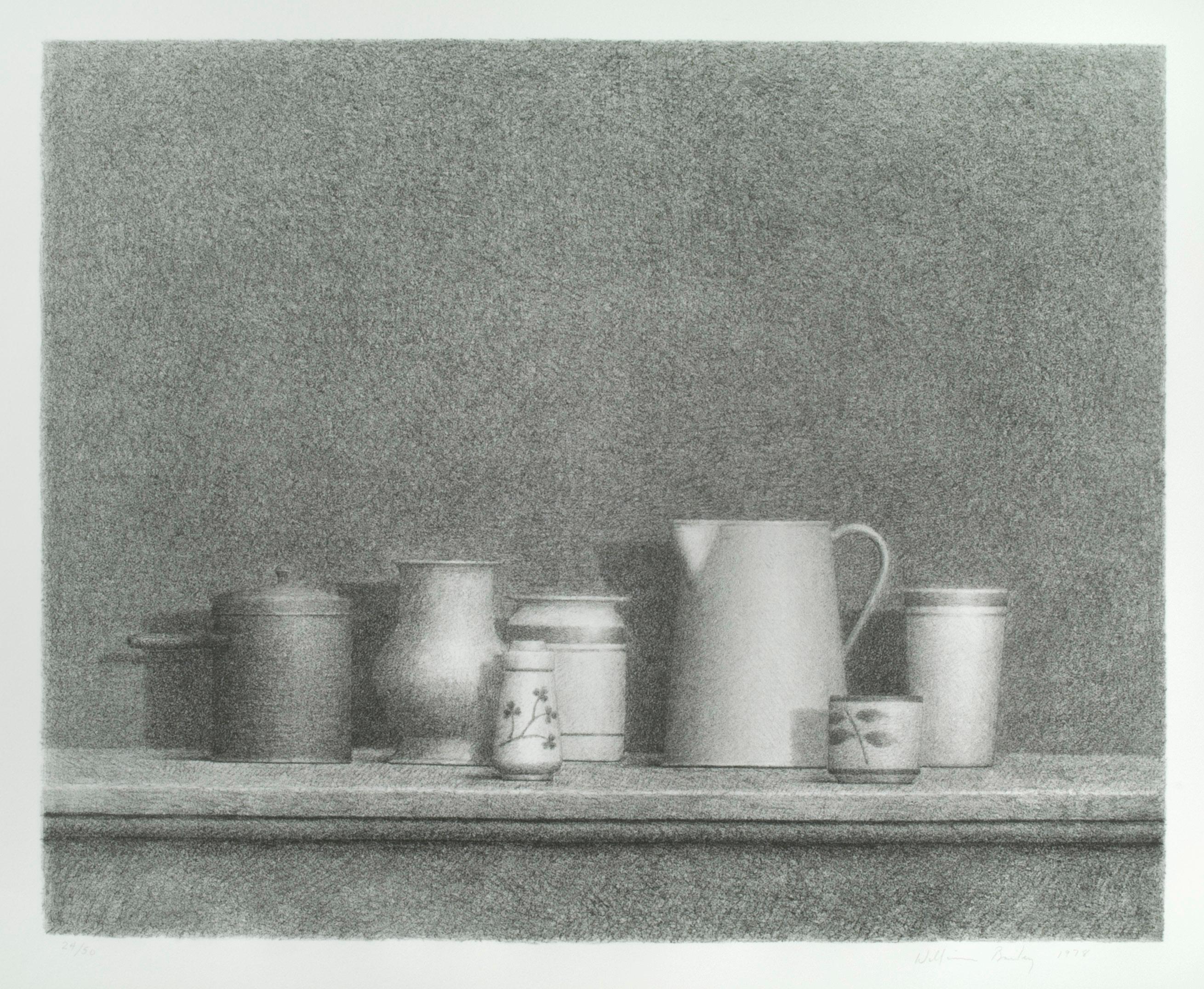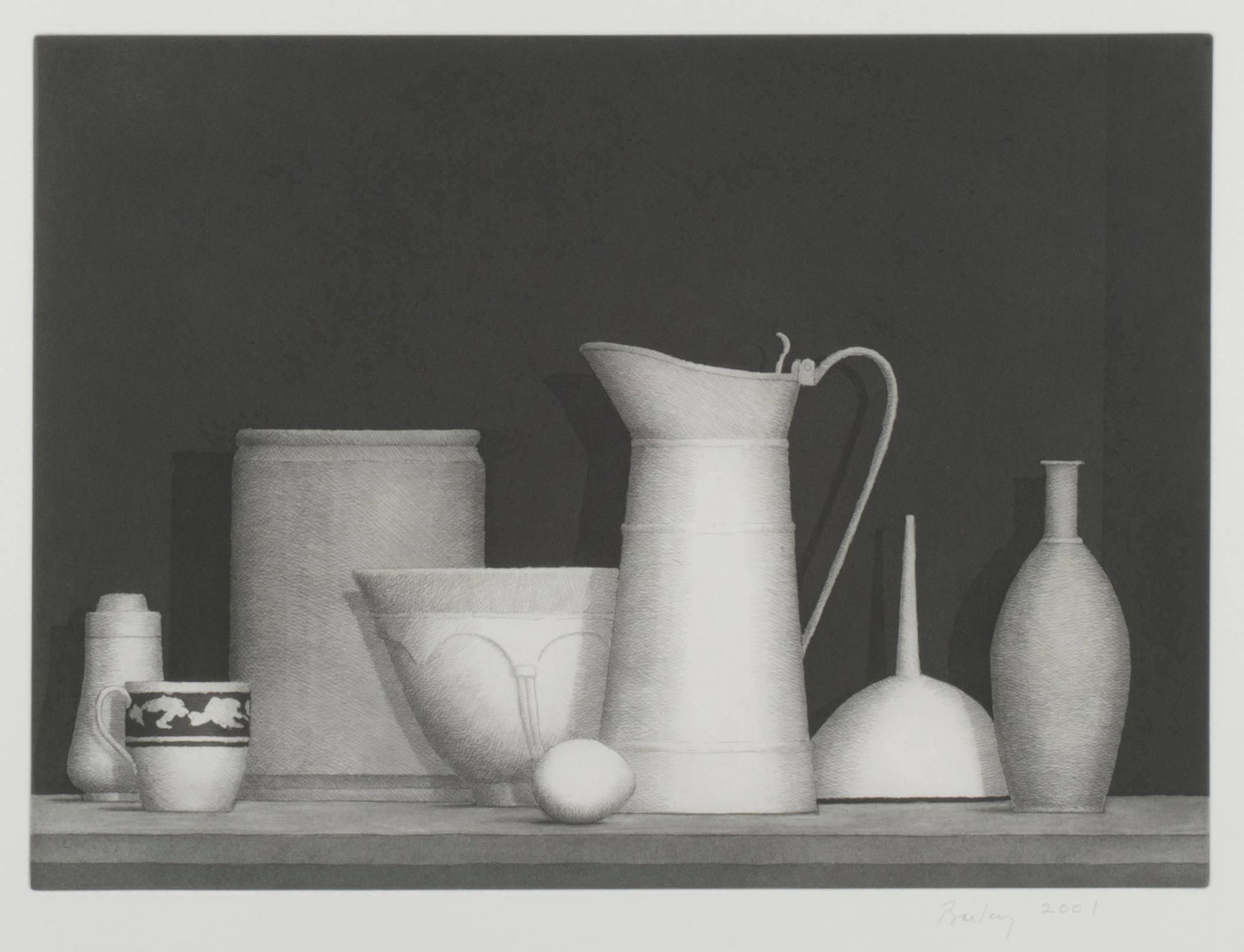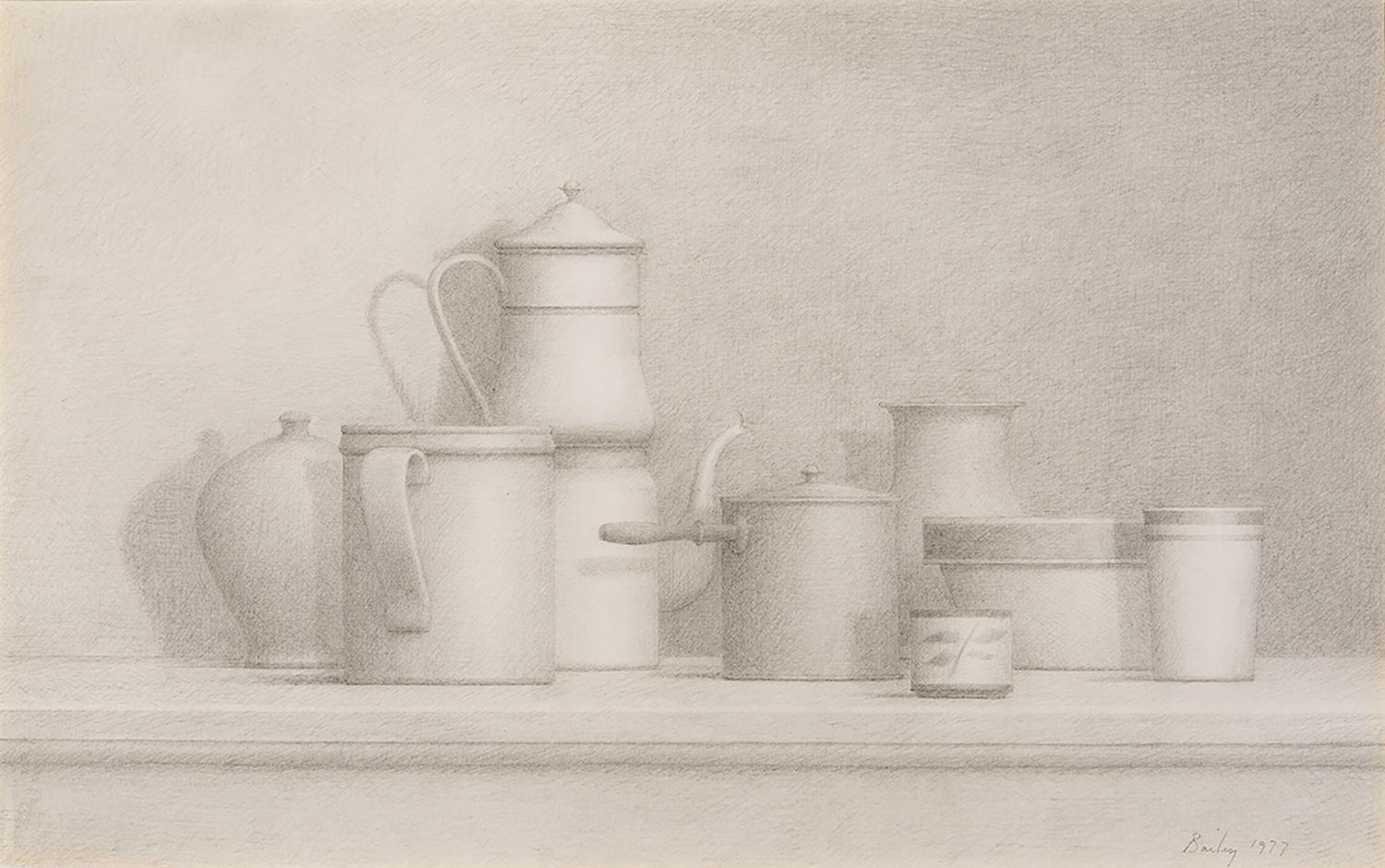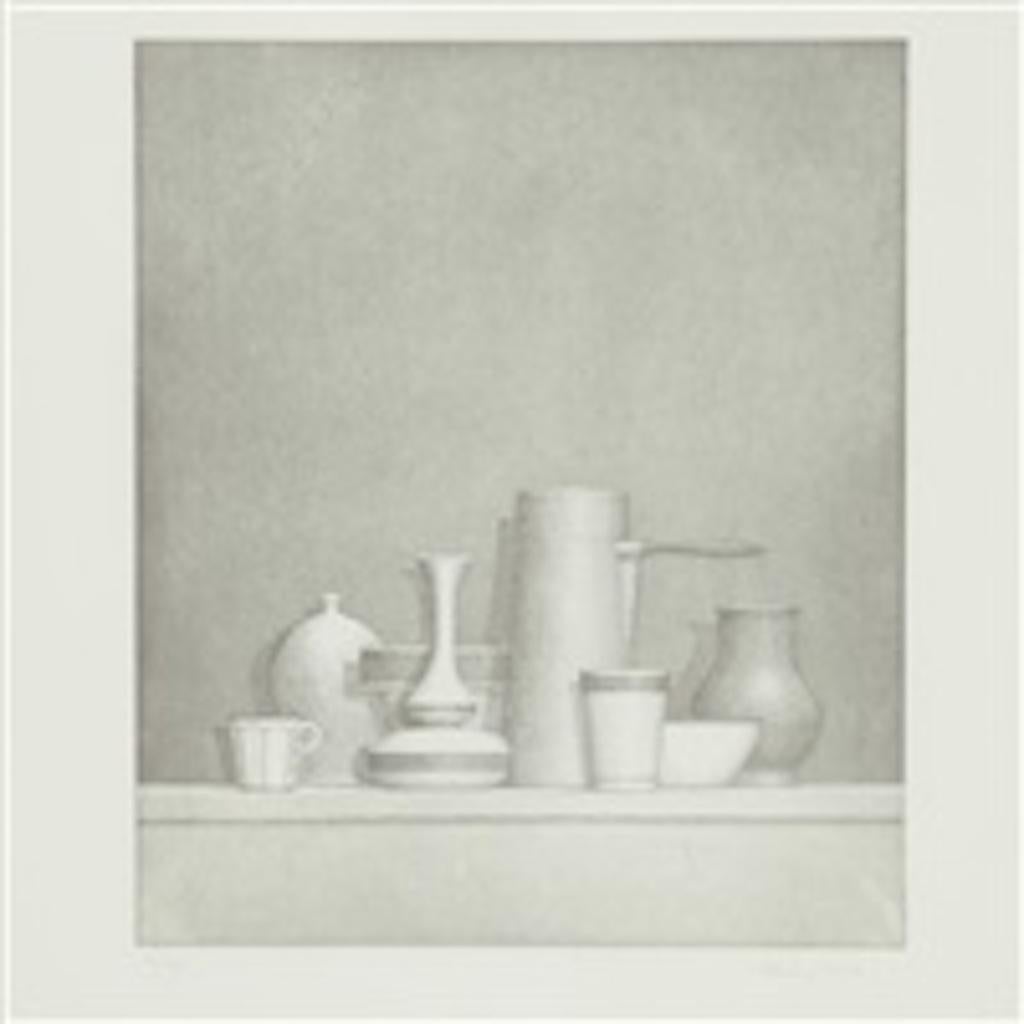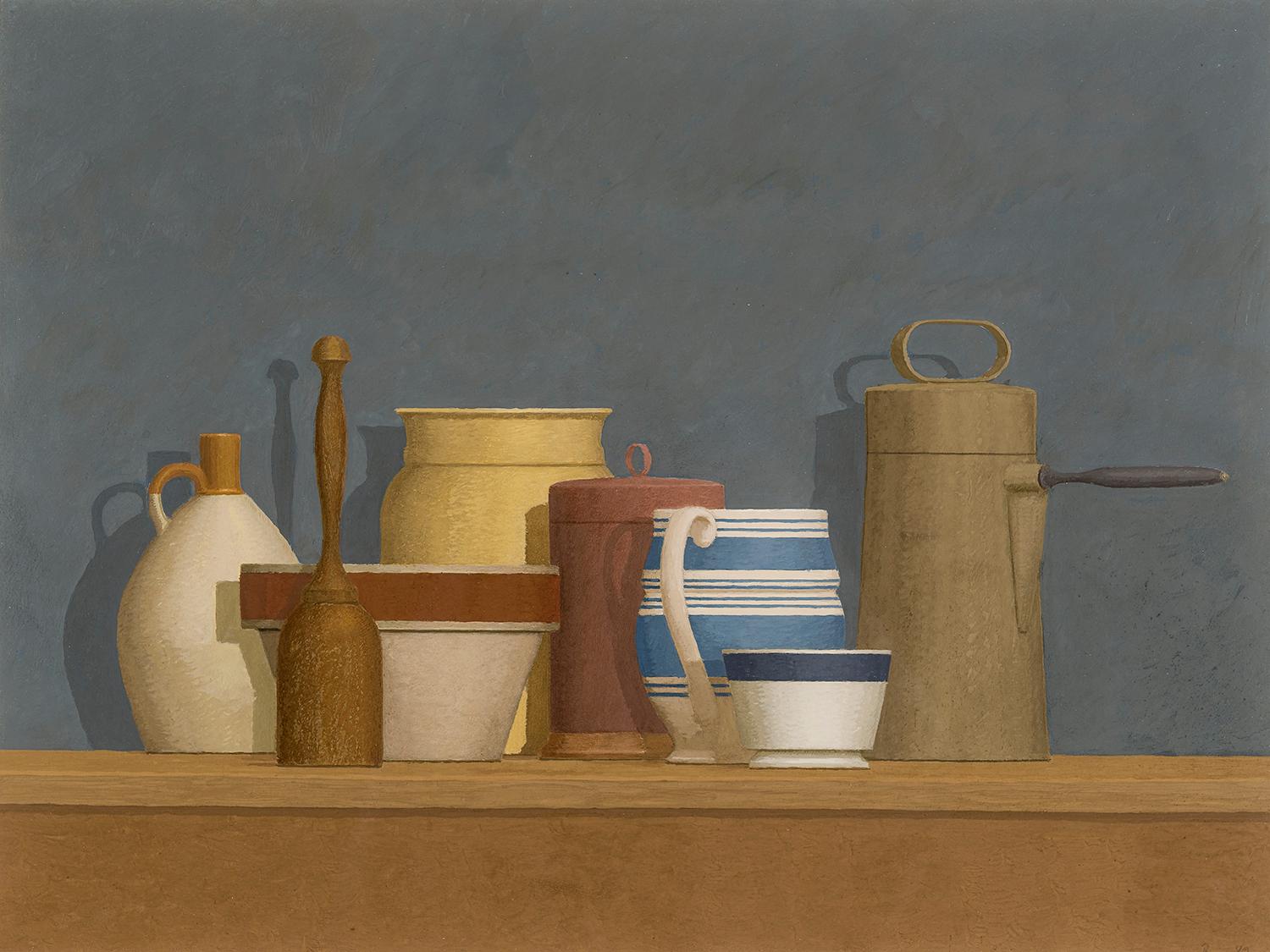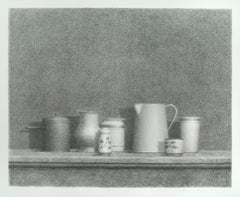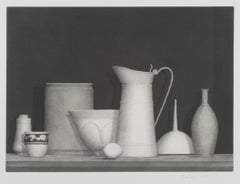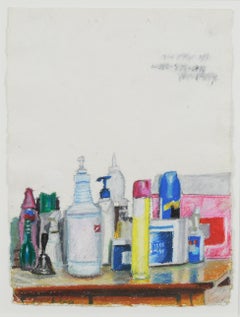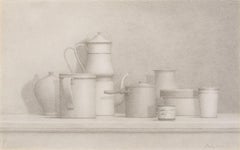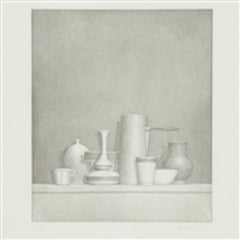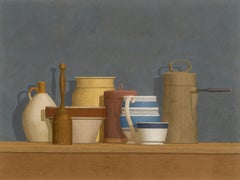Want more images or videos?
Request additional images or videos from the seller
1 of 10
William H. BaileyStill Life No. 51978
1978
$1,500
£1,141.88
€1,305.41
CA$2,110.52
A$2,308.56
CHF 1,215.52
MX$27,561.88
NOK 15,491.99
SEK 14,171.47
DKK 9,750.04
About the Item
Still Life No. 5
Lithograph, 1978
Signed, dated and numbered in pencil (see photos)
Edition: 50 (24/50)
Published by Solo Press, New York, 1978
Printer: Judith Solodkin, first femal master printer graduate of Tamarind Institute.
Condition: Good
large margins with tape residue from previous matting
Image size: 18 x 22 1/2 inches
Sheet size: 26 x 20 3/8 inches
William Bailey studied art at the University of Kansas, Yale University and Yale School of Art where he studied with Josef Albers receiving his MFA in 1957.
Mr. Bailey’s first exhibition in New York was at Robert Schoelkopf Gallery in 1968, where he showed regularly until its closing in 1990. During the 90’s he exhibited at the Andre Emmerich Gallery and on its closing, exhibited at the Robert Miller Gallery. In 2004 Bailey moved to the Betty Cuningham Gallery where his most recent exhibition was held from April 30 - June 11, 2016.
Mr. Bailey’s work has been exhibited extensively in both America and Europe. He is represented in the collections of The Whitney Museum of American Art, The Museum of Modern Art, the Pennsylvania Academy of Fine Arts, and the Hirschhorn Museum and Sculpture Garden, among others. He was awarded a Guggenheim Fellowship in painting in 1965. Mr. Bailey was elected to The National Academy of Design in 1983 and to The American Academy of Arts and Letters in 1986.
Mr. Bailey taught at The Yale School of Art from 1958 to 1962 and from 1969 to 1995. He has also taught at The Cooper Union, University of Pennsylvania and Indiana University. He maintains studios in New Haven and in Umbertide, Italy.
Courtesy Betty Cunningham Gallery
Tribute to William Bailey
THE NEW YORK TIMES
William Bailey, whose pristine, idealized still lifes and female nudes made him one of the leading figures in the return of figurative art in the 1980s, died on April 13 at his home in Branford, Conn. He was 89.
His death was confirmed by his daughter, Alix Bailey.
Beyond his painting, Mr. Bailey influenced generations of students in his many years as a teacher at the Yale School of Art.
In some of his best-known work, Mr. Bailey arranged simple objects — the eggs, bowls, bottles and vases that he once called “my repertory company” — along a severe horizontal shelf, or on a plain table, swathing them in a breathless, deceptively serene atmosphere heavy with mystery.
- Creator:William H. Bailey (1930, American)
- Creation Year:1978
- Dimensions:Height: 18 in (45.72 cm)Width: 22.5 in (57.15 cm)
- Medium:
- Movement & Style:
- Period:
- Condition:
- Gallery Location:Fairlawn, OH
- Reference Number:Seller: FA111591stDibs: LU14015192272
About the Seller
5.0
Recognized Seller
These prestigious sellers are industry leaders and represent the highest echelon for item quality and design.
Gold Seller
Premium sellers maintaining a 4.3+ rating and 24-hour response times
Established in 1978
1stDibs seller since 2013
835 sales on 1stDibs
Typical response time: <1 hour
Associations
International Fine Print Dealers Association
- ShippingRetrieving quote...Shipping from: Fairlawn, OH
- Return Policy
More From This Seller
View AllStill Life No. 5
By William H. Bailey
Located in Fairlawn, OH
Still Life No. 5
Lithograph, 1978
Signed, dated and numbered in pencil (see photos)
Edition: 50 (24/50)
Published by Solo Press, New York, 1978
Printer: Judith Solodkin, first femal ...
Category
1970s American Realist Still-life Prints
Materials
Lithograph
Untitled (Still Life)
Located in Fairlawn, OH
Untitled (Still Life)
Etching, aquatint and soft ground, 2001
Signed in pencil (see photo)
Edition: 260
Published by the Print Club of Cleveland, Publication 80, 2002
Printed by Felix Harlan at Harlan and Weaver, New York
William Bailey, Modernist Figurative Painter, Dies at 89
He swathed his nudes and still lifes of eggs, vases, bottles and bowls in a breathless, deceptively serene atmosphere heavy with mystery.
The painter William Bailey in 2009. He was never given a career survey in a major museum, but his influence, particulary on students at Yale, was deep.Credit...Ford Bailey
By William Grimes for the New York Times
April 18, 2020
William Bailey, whose pristine, idealized still lifes and female nudes made him one of the leading figures in the return of figurative art in the 1980s, died on April 13 at his home in Branford, Conn. He was 89.
His death was confirmed by his daughter, Alix Bailey.
Beyond his painting, Mr. Bailey influenced generations of students in his many years as a teacher at the Yale School of Art.
In some of his best-known work, Mr. Bailey arranged simple objects — the eggs, bowls, bottles and vases that he once called “my repertory company” — along a severe horizontal shelf, or on a plain table, swathing them in a breathless, deceptively serene atmosphere heavy with mystery.
His muted ochres, grays and powdery blues conjured up a still, timeless world inhabited by Platonic forms, recognizable but uncanny, in part because he painted from imagination rather than
“They are at once vividly real and objects in dream, and it is the poetry of this double life that elevates all this humble crockery to the realm of pictorial romance,” Hilton Kramer wrote in The New York Times in 1979.
Mr. Bailey’s female figures, some clothed in a simple shift or robe and others partly or entirely nude, are disconcertingly impassive, implacable and unreadable, fleshly presences breathing an otherworldly air.
The critic Mark Stevens, writing in Newsweek in 1982, credited Mr. Bailey with helping to “restore representational art to a position of consequence in modern painting.”
But his version of representation was entirely idiosyncratic, seemingly traditional but in fact “a modernism so contrarian,” the artist Alexi Worth wrote in a catalog essay for the Betty Cuningham Gallery in 2010, “that it feels, despite its historical sophistication, almost like a brand of outsider art.”
William Harrison Bailey...
Category
Early 2000s Contemporary Still-life Prints
Materials
Etching
Big Momma's Still Life #2
By Sedrick Huckaby
Located in Fairlawn, OH
Big Momma's Still Life #2
Oil pastel on rag paper, 2007
Signed by the artist lower left: "Sedrick Huckaby III" (see photo)
Sheet size: 16 x 12 1/8 inches
Frame: 28 x 24 inches
Exhibi...
Category
Early 2000s Contemporary Still-life Paintings
Materials
Oil Pastel
Big Momma's Still Life #2
By Sedrick Huckaby
Located in Fairlawn, OH
Big Momma's Still Life #2
Oil pastel on rag paper, 2007
Signed by the artist lower left: "Sedrick Huckaby III" (see photo)
Sheet size: 16 x 12 1/8 inches
Frame: 28 x 24 inches
Exhibi...
Category
Early 2000s Contemporary Still-life Paintings
Materials
Oil Pastel
Still Life with Tromp L'Oeil
By William Sommer
Located in Fairlawn, OH
Still Life with Tromp L'Oeil
Graphite and watercolor on a book page.
Signed in ink by the artist lower right corner
(see photo)
Provenance:
Estate of the artist (Estate No. 00916 verso)
Ray Sommer (the artist's son)
Joseph M. Erdelac (No. 18 JME verso)
Book page verso is an illustration of a Durer woodcut...
Category
1920s American Modern Still-life Drawings and Watercolors
Materials
Watercolor
Buds
By Jack Beal
Located in Fairlawn, OH
Buds
Color lithograph, 1980
Signed, titled, and editioned in pencil by the artist
Publisher: Art Matters
Printer: Bud Shark, Shark's Ink, Lyons, CO
Condition: Excellent
Image: 31-1/8 x 41-1/4" (79 x 104.7 cm.)
"An Abstract Expressionist when he left the Art Institute of Chicago in 1956, Beal has since become a dedicated realist who sees art as a potentially powerful moral force. He has great regard for Platonic ideals of truth, beauty, and goodness, and admires both the realism of seventeenth-century Dutch painting and the compositional authority of Renaissance art. Since moving to New York in the late 1950s with his wife, painter Sondra Freckelton, Beal has painted still lifes, portraits, and landscapes, although in recent years his most ambitious undertakings have been large-scale allegories and myths. In describing his approach, Beal calls himself a "life painter" and says he is committed to human over aesthetic concerns. Yet his intricate complexes of figures and surface patterns, along with his adroit handling of space, reveal his sophisticated, accomplished sense of composition.
Virginia M. Mecklenburg
Biography
Jack Beal (1931-2013) was born and raised in Richmond, Virginia. He briefly attended the College of William and Mary, studying biology, but dropped out after two years. A decision to take evening art classes lead to his attending the Art Institute of Chicago, where he studied from the old masters in the Institute’s collection and with Isobel Steele MacKinnon, a student of Hans Hoffman. His classmates there included Red Grooms, Richard Estes, Claes Oldenberg and Robert Barnes, and while abstract expressionism remained “the only valid way to paint,” it was a style that all would eventually reject. In 1956 Beal left the Art Institute and moved to New York with the aim of finding success as a painter, eventually becoming one of the first artists to settle in the SoHo neighborhood.
A turning point came in 1962 when, spending the summer in upstate New York, Beal decided to begin painting outdoors. Dissatisfied with abstract painting, he “wanted to give Art one more try” and in working from nature “fell in love with painting all over again.” Over the next few years Beal worked toward a balance between expressionistic paint handling and realistic, narrative pictures. Clement Greenberg’s pronouncement around this time, that the figure was no longer a valid subject was taken as a challenge by many artists, Beal included. His subsequent adoption of the female nude - modeled by his wife, the artist Sondra Freckelton - was a break-through. Though the paintings retained the sensuousness of his earlier canvases, the rigorous formality of their composition and the masterful treatment of light and shadow offered a new approach to realist painting. Indeed, Beal was not alone in this transformation; friends and colleagues in New York were coming to similar conclusions and the group, who included painters such as Philip Pearlstein, Alfred Leslie, Yvonne Jacquette, Alex Katz, Jack Tworkov, Nell Blaine and Fairfield Porter, would eventually be considered the ‘New Realists.’
With the resurgence of figurative painting, Beal distinguished himself for his skillful handling of color and modeling as well as what was later described as his “pushing of representational forms to their interface with abstraction”. Through the later half of the 1960s, while his subject matter remained unchanged, his paintings were increasingly given over to wide areas of flat color. In 1969, he exhibited a series of Table Paintings which, with their hard-edge style and near complete abstraction of the form, were a radical departure for Beal. So radical in fact, he was accosted by fellow realist painters Alfred Leslie and Sidney Tillim, who berated him “for betraying realism and betraying [himself], for moving away from ‘the true path’.” The incident had its intended effect and Beal did return to a more naturalistic and humanistic style, eventually abandoning the nude in favor of increasingly allegorical portraits. In 1974, the United States General Services Administration commissioned Beal to produce a series of murals for the U.S. Department of Labor headquarters in Washington D.C. The result was The History of Labor, four, 12 x 13 foot paintings in the vein of George Caleb Bingham, each illustrating a century of American development.
Following the completion of the murals in 1977, Beal continued to make use of narrative in his paintings, with portraiture and self-portraiture as a means of exploring moral and didactic themes. He and Sondra had purchased an old mill in upstate New York in 1974 and after extensive renovations, it became their permanent residence. Unsurprisingly, many of his later paintings are pastoral scenes based on his rural surroundings or still lives including flowers which they grew on the property. In 1986, Beal was commissioned by the Art in Transit Initiative to create a large-scale mural as part of the redevelopment of the Times Square Subway Station. The proposed mosaic mural, The Return of Spring, took over fifteen years to complete, with the two, 7 x 20 foot sections finally installed in 2001 and 2005. Together they update the Greek myth of Persephone with a New York setting, showing her abduction by Hades, initiating the arrival of winter, and her release, bringing the bountiful return of spring.
Beal was a founder of the Artist’s Choice Museum, New York and the New York Academy of Art as well as the recipient of numerous grants and awards, including honorary degrees from the Art Institute of Boston and the Hollins College...
Category
1980s Contemporary Still-life Prints
Materials
Lithograph
$1,200
You May Also Like
Still Life
Located in New York, NY
Signed (at lower right): Bailey 1977
Category
Late 20th Century Contemporary Still-life Drawings and Watercolors
Materials
Paper, Pencil
Untitled (Still Life)
Located in New York, NY
William Bailey
Untitled (Still Life)
Etching and aquatint on wove paper, with full margins
1982
S. 27 1/2 x 22 in. (69.9 x 55.9 cm)
Signed and dated in pencil lower right "Bailey ...
Category
1980s Contemporary Prints and Multiples
Materials
Etching, Aquatint
Still Life - Niccone
Located in New York, NY
William Bailey’s still life paintings present seemingly everyday objects, including bowls, pitchers, and cups, in groupings that conjure the familiar world while offering a metaphysi...
Category
20th Century Contemporary Still-life Paintings
Materials
Paper, Casein
Still Life #2
By Audean Johnson
Located in San Francisco, CA
This artwork "Still Life #2" 1989 is an original color lithograph by American artist Audean Johnson. It is hand signed and numbered 207/275 in pencil by...
Category
Late 20th Century American Realist Figurative Prints
Materials
Lithograph
STILL LIFE WITH LEEKS
By James Aponovich
Located in Portland, ME
Aponovich, James. STILL LIFE WITH LEEKS. Lithograph, not dated. Edition of 100, numbered 41/100, titled, and signed in pencil. 18 x 24 inches, plus margins. Margins appear somewhat t...
Category
20th Century American Realist Prints and Multiples
Materials
Lithograph
Still Life #3
By Audean Johnson
Located in San Francisco, CA
This artwork "Still Life #3" 1989 is an original color lithograph by American artist Audean Johnson. It is hand signed and numbered 227/275 in pencil by...
Category
Late 20th Century American Realist Figurative Prints
Materials
Lithograph
More Ways To Browse
Baileys Vintage
Donald Art Co Lithograph
Donald Baechler Rose
Elizabeth Osborne Poster
Gary Bukovnik Posters
Geraldine Girvan
Hugh Kepets On Sale
Japanese Botanical Prints
Lichtenstein Spray Can
Michelle Stuart On Sale
Mr Brainwash Flower
Oisin Byrne
Paris Review Posters
Paul De Longpre Vintage Prints
Robert Furber Twelve Months Of Flowers
Robert Furber
Thiebaud Signed Print
William Ross Abrams
